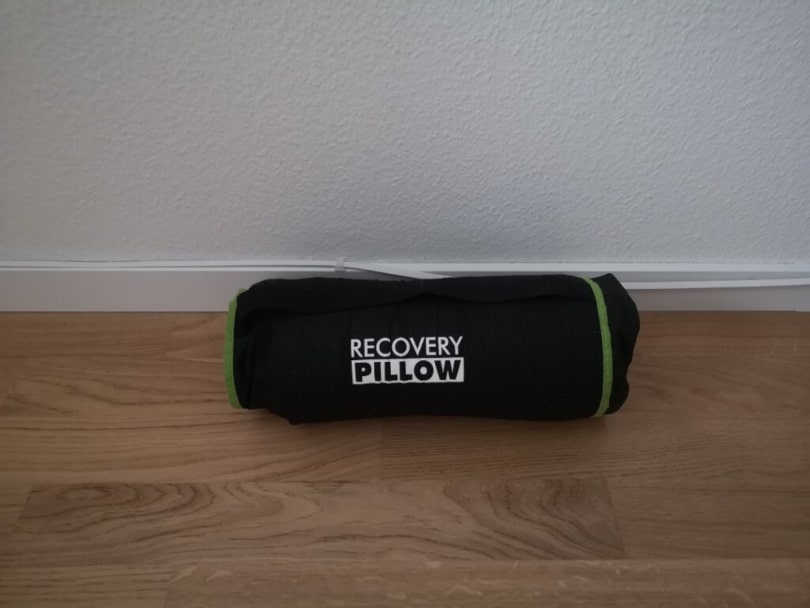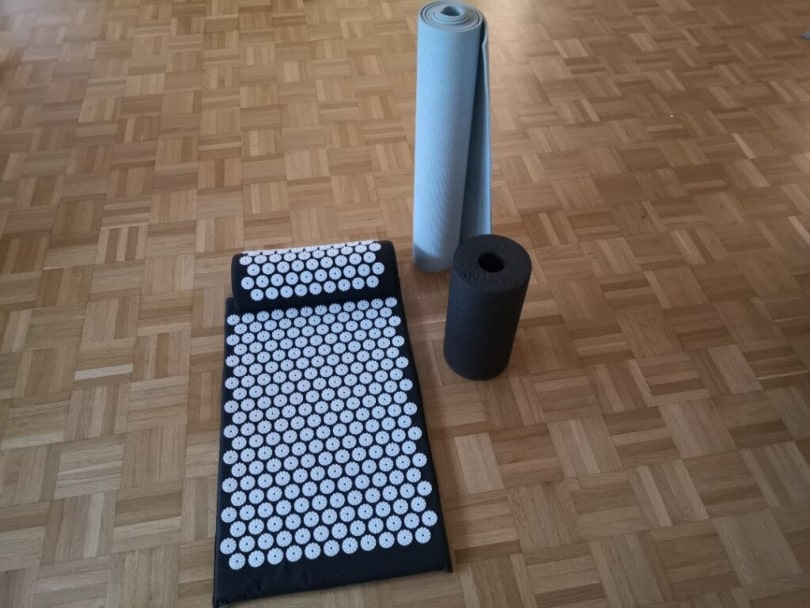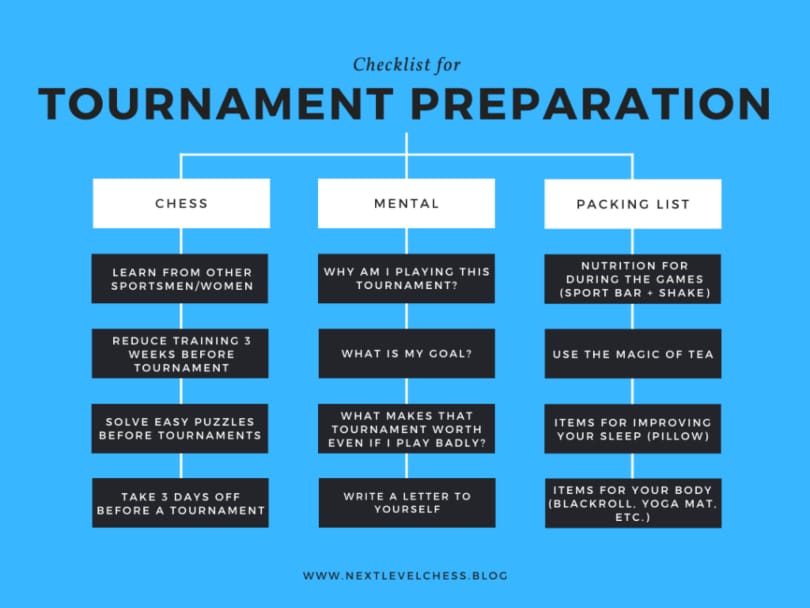Everybody wants to be in good form at a tournament.
But just by wanting something you don’t automatically get it. To be in good form at a tournament, you need good preparation before the tournament.
By failing to prepare, you are preparing to fail
Benjamin Franklin
Sadly most Chess Players leave it to luck or ‘circumstances’ if they will be in good form. Others even set themselves up for a disaster. And mostly without realizing it!
In this article, I will explain to you how I prepare for a tournament. And the things you should absolutely do as well, no matter if you are an amateur or (aspiring) professional.
Good preparation has to happen on three different levels:
- Chess preparation
- Mental preparation
- General preparation (packing)
Chess preparation
The training you do before a tournament will influence your form at the tournament.
Obviously, there is no training that guarantees great form. But some things can drastically increase or decrease the likelihood of good form.
Chess Is A Sport
A key element is the understanding that Chess is a sport. With that in mind, you can learn from other Sports how they approach the problem of good form.
One of the biggest mistakes I see in Chess preparation is the following: With a tournament upcoming, one tries to study much harder. One feels that the work done before the tournament will lead to good form.
Actually, this sounds logical but is totally wrong.
Just look at other Sports. Do you know of any Sportsperson that does his hardest training just before an important competition?
Did you ever hear of an Olympian that said “one day before the most important competition of my life I had the hardest training session ever”?
I can’t think of one! The hard training should be done in advance.
Training Intensity
What I learned from several friends in Sports is the following:
Coming closer to a competition you should DECREASE not INCREASE intensity and frequency of your training.
The hardest Training is done in the off-season when nobody watches. That is the time when Sportspeople build up their muscles and tactical arsenal.
Let’s take Swimmers as an example. I have two close friends that were competitive Swimmers. Just by listening to them talk about their training, I learned a lot.
The most difficult time was when they had no competition in sight. This was the right time to build up muscles and work deeply on their technique. It was the foundation they built for the coming season.
When competitions were around the corner, their arsenal was built. It was simply the goal to keep the level and use all they had prepared a long time ago.
In between competitions, they could only adjust small things.
What does this mean for Chess?
Obviously, the part about building up our muscles does not really matter in chess. But what matters is that fundamental changes should not be done before a tournament.
The fundamental work should be done at a time we don’t plan on performing too well.
I take at least 2-3 months/per year when I basically don’t play tournaments. This time is meant for me to work hard on my chess. I can do the following at this time:
- Improve, expand, and change my opening repertoire
- Work on calculation with really tough exercises
- Train new strategical concepts
- Get in physical shape by working on my endurance (mostly by running and cycling)
In the time shortly before a tournament, I will just make little adjustments to the three points above. I will try to keep my level and make the best that I can show all I learned.
My repertoire stands and I will simply improve upon my played games.
Roughly 3 weeks before a tournament, I will start to slow down my training. Each training gets shorter, and there will be fewer sessions.
To preserve my confidence, the exercises I solve before a tournament will get much easier.
Why that?
Because if you fail to solve a lot of exercises before a tournament you will feel discouraged. You should absolutely avoid this!
Your normal rate of solving exercises should be around 60-70%.
Before a tournament, it is nice to dial it up to 90-100%. The goal is not to improve your calculation skills, but to get your head going and build up confidence!
Instead of working on new opening lines, I start to repeat the repertoire I want to play in this tournament. This helps me to get into the right mindset and save time and energy during the tournament.
If you don’t really have a repertoire yet, then read my article on opening preparation. I go through my process of analyzing openings and creating your opening repertoire.
Again, this is NOT work you should do only some days before a tournament!
I always try to take the last 3-4 days before a 9-day tournament off. If the tournament is shorter, I recommend taking 30% of the tournament duration off before it starts (for 6-day tournaments 2 days, for weekend tournaments 1 day).
I have done everything I could, and now it is time to recharge my batteries.
If you can’t take free days from work before a tournament, then at least take days off of chess before a tournament!
Chess training is usually only showing results in the long term.
Those last-minute efforts will only stress you out.
And as you need time to absorb and implement what you learned, you are actually confusing yourself short-term.
Mental Preparation
A big part of reaching your potential at a tournament is how well you feel mentally. If I don’t prepare mentally for a tournament, it is basically pure luck if I end up playing well.
When deciding on a tournament, you will always have some unconscious hopes and goals. If you are not fully aware of those, you might struggle to keep good humor and motivation during the tournament.
If you play great from round 1, the lacking mental preparation usually doesn’t show itself.
But as soon as something does not go according to your wishes, you will need good preparation to avoid the crisis.
3 Questions To Ask Yourself Before Every Tournament
To keep it easy, you can simply ask yourself 3 questions before any tournament. This helps to clarify your hidden agenda to yourself.
Ask yourself:
- Why am I playing in this tournament?
- What is my goal?
- What makes that tournament worth it even if I play badly?
Be totally honest with yourself. We, humans, are masters in lying to ourselves. Sometimes you have a very unrealistic hope. If that is so, you need to write it down.
If you write down 5th place as your goal, but in reality, you absolutely want to win the tournament, you are setting yourself up for disaster.
There is one big red light for me before a tournament:
If the only reason I play a tournament is connected to a result (usually winning rating or the tournament) it will be extremely hard to keep motivated in case something goes wrong.
A too-big focus on the result will put a lot of weight on your shoulders with additional pressure.
There are only very few Athletes that need that pressure to compete well.
Most of us can bring out our best chess when we enjoy the process.
The third question should help you balance a too big focus on the result. What usually helps me is thinking about the learning curve instead of the result.
It is also totally fine to think about meeting friends or visiting a nice place.
Just make sure there is a reason to still see the tournament as a “success” even if the results are not to your liking.
This will set you free of unnecessary pressure and help you to perform better.
If you want to deepen your mental knowledge and skills I recommend starting with the following resources:
- The Champions Mind by Jim Afremow
- The Tim Ferriss Podcast with renowned Sports Psychologist Jim Loehr
I have profited tremendously from working with a Sport-psychologist.
He is like a best friend that listens to me and gives me grounded, unemotional feedback. I don’t understand nor like the big skepticism in our society when it comes to psychologists.
One reason why there is still such skepticism might be uneducated mental Coaches. At least in Switzerland, there is a big difference between a “mental Coach” and Sport Psychologist.
While everyone can call oneself a “mental Coach”, Sports psychologist is a title you only get after studying psychology and then adding a specific sport psychology study on top.
Before you try to hire somebody yourself, make sure you know if that person is self-taught or has actual results and studies to back their claims up.
A Letter To Yourself
If you struggle to keep your motivation when a tournament goes bad, you can do the following:
Write a letter to yourself meant to be read after a very disappointing game. This helps me to remember what person I want to be. And it gives me the strength to fight back even if shit happens.
Let me tell you something clear and loud: SHIT WILL HAPPEN SOONER OR LATER.
No matter how well you are prepared, there will be disappointments. There will be less if you prepare well.
And most importantly you will be ready to keep your head high up whenever disaster happens!
But there is no way to avoid disappointments altogether. I’m writing this the day after Switzerland heroically beat the World Champion France in the Football European Championship (EURO 2020).
And you know why France lost? Because the probable future World Best Footballer Kylian Mbappé missed a penalty kick! Even he can not avoid disappointment! So who are we to think we can?
In the end, that is what preparation is made for: being ready to face difficult situations. Everybody can feel good when winning all the games. Only a few people manage to feel good (or ok at least!) when things are going downside!
General Preparation
Now that your Chess and your mind are taken care of, you can take care of some organizational things. While it might seem unnecessary to some, doing this will give you an unfair advantage.
Why?
Because by taking care of possible problems beforehand you will have more energy left for your game.
Think about all the things you need during a chess tournament to increase your well-being.
This is too vague for you? Then let us look at my packing list before any tournament. I hope this gives you some ideas about what you might think about before your next tournament.
Along with the standard things such as clothes, you will find the following:
- Food for during the game
- Endurance shake
- My Pillow
- Tea for during and after the game
- Yoga Mat
- Acupuncture Mat
- Supplements
- Blackroll
That is quite a list. And yes, it can be quite a hustle to travel with all these things. But I feel much better if I got these on each and every tournament.
Before you just skip this altogether, let me tell you: I have built up this list over years.
Even if you start with one essential thing, it can tremendously improve your well-being. And thus your results. Then you slowly build up your list as you feel some needs during tournaments.
Let’s go one by one through the most important categories:
Nutrition
Disclaimer: I am no nutritionist or doctor nor do I want to play one on the internet. This is just my personal view and what worked for me. It is for informational purposes only.
Nutrition is key for a well-working mind. During the game, one uses lots of energy and calories. To keep the focus for a longer time, you need to make sure to feed your body with the right nutrients.
If you try to fill up your Tesla with gasoline, his 550 PS won’t matter. A Tesla only works with the right energy: electricity. The same goes for your body.
Rule number 1 with nutrition is the following: Never experiment on a tournament.
We react differently to different foods. Just buying some similar-looking Sport-Bar in a supermarket close to where you play a tournament is NOT a good idea. Different Bars have different ingredients.
Some are full of sugar, and others have little sugar. Make sure to take something that really fits your needs!
That is why the easiest solution is simply to find a product that works for you at home. Try out different things and choose only what makes you feel great. Then bring it to the tournament.
I usually go as far as to take my own breakfast cereals to any tournament. I know what works, so I don’t want to risk eating something that doesn’t suit me perfectly.
You don’t have to be as obsessive about it as I am.
But some basic food for during the game should be on the packing list of EVERY Chess-Player.
I like the mix of some sports Bar and a shake. Something liquid and something to eat is a nice balance. Sometimes you don’t feel hungry, so you can take the nutrients by drinking.
Once you find what works for you, you simply need to buy it early enough to bring it to the tournament with you.
So don’t start to pack the night before the tournament. Start to think about what you need to buy beforehand 1 week before your travel date.
The Magic Of Tea
Tea helps me get my digestion right, even if the food in the Hotel is not great.

It is seldom that the food at a chess tournament is really great. So it is important to have a solution already in your baggage. Tea is a natural way of helping your stomach if it is struggling.
Nearly everywhere you can find boiling water, which is the only thing you need. Again, I sometimes take even my own water cooker to tournaments. I’m just trying to avoid any unpleasant surprises.
The same goes for supplements. I take these supplements at home and at tournaments.
No experiments on tournaments. Just take something if you are sure it really helps you.
Note that I work with a renowned Nutritionist.
What works for somebody, doesn’t work for another. That is also why I do not link you to any supplements I take. Talk to your doctor or nutritionist if you want to get into this.
Sleep
If you sleep badly, your brain will not work at full capacity. Sleeping well away from your own nice warm bed can be tough. That is why I take my own pillow on every trip.
The recovery pillow is great for traveling because you can easily make it small and transport it in any luggage or even backpack. It is very soft and designed for all kinds of sleepers (back, front & side).

Already one night without my beloved pillow will mess with my readiness to play a good game.
I don’t say it is impossible. Simply that the likelihood of playing a good game increases by sleeping on that same pillow every night.
Some people also struggle with light at night. As some hotel rooms have very bad curtains, it might be smart to take a sleeping mask to tournaments.
Just take some time to think about what is key for you to have a good night’s sleep?
Whatever is not the mattress or Duvet, you should be able to transport it in a piece of luggage.
Again, once you establish what helps you, it is simply a task to have it ready whenever you travel to tournaments.
Physical Readiness
Only if your body is well, your mind can work well. That is why I take my Yoga Mat, my acupuncture mat, and my Blackroll to any tournament.

This allows me to do my workouts in the room if there is no gym in the hotel. Additionally, I can relax my muscular tensions by simply lying on the acupuncture mat in the evenings. This is a great way to relieve some stress.
The same goes for my Blackroll. This is a massaging roll that helps me relieve muscular tensions in my back and neck. The stress and long sitting time can get to me, so that is a great way of countering it.
If you suffer from back or neck pain, I can only recommend those products I use. I have obsessively tried many (too many…) things and am very happy with my setup now.
For your more personal needs, start with the question:
Which item do I use daily that improves the quality of my life?
This item is probably a no-brainer to bring to tournaments. Then take it from there!
Summary
Your tournament preparation should be divided into three steps:
- Chess preparation
- Mental preparation
- General preparation (packing)
Here are the key points of each one of them:

I hope this article has widened the idea of how to achieve great form. Many small mosaics are part of it.
Don’t feel bad if you have done none of it up to now. Just pick what seems most essential to you and start small.
Over time you can build up your own tournament preparation habits.
Sincerely,
Noël
Ps: If you liked this article, you will probably also like my FREE Guide to organize your chess training. Get it HERE.